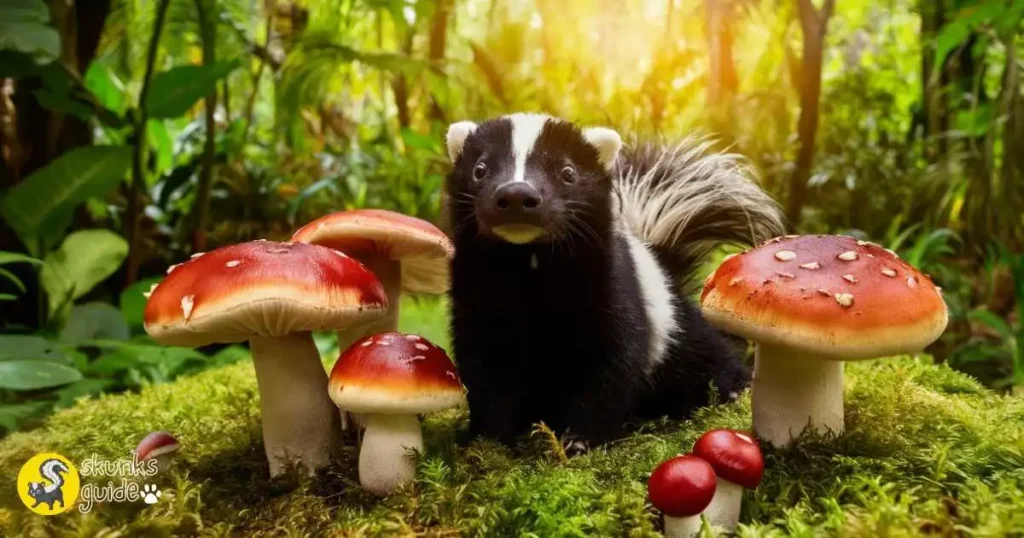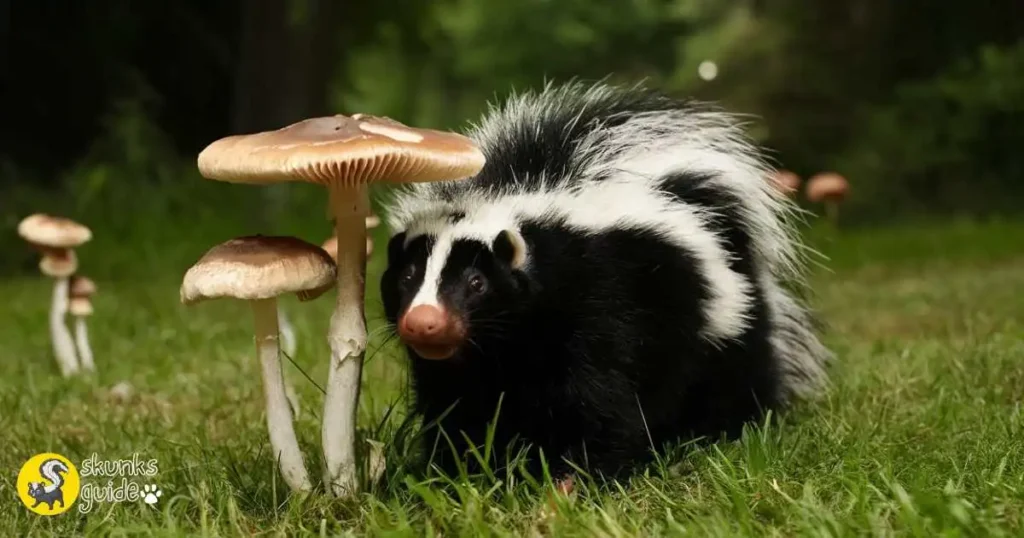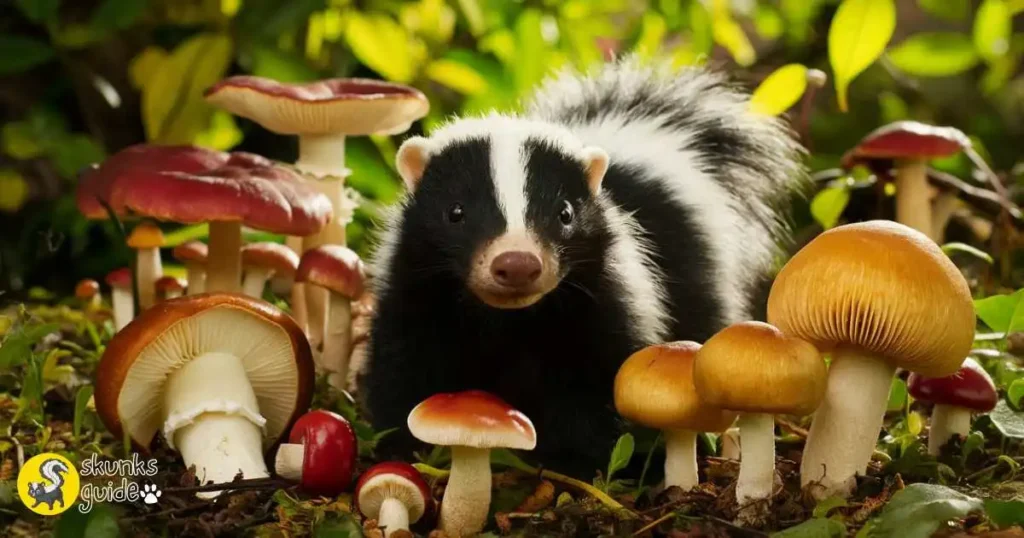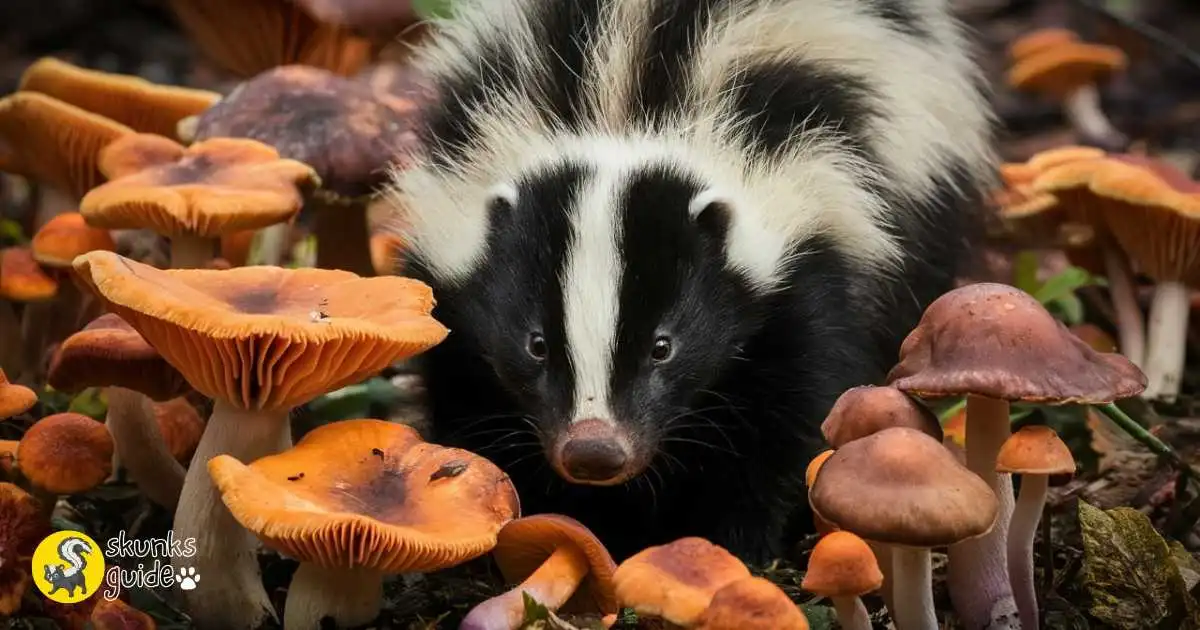Can Skunks Eat Mushrooms? Let’s find out!
Last updated on August 11th, 2024 at 07:25 am
Yes, skunks do eat mushrooms. They are omnivores and their diet includes a variety of foods.
Skunks are known for their distinctive black and white coloring and their ability to spray a foul-smelling liquid as a defense mechanism. Beyond these well-known traits, skunks are omnivorous creatures, which means they eat both plants and animals. Their diet is quite diverse, encompassing insects, small mammals, fruits, and indeed, mushrooms.
Skunks often forage at night, using their keen sense of smell to locate food. The inclusion of mushrooms in their diet showcases their adaptability in various habitats where these fungi are readily available. As opportunistic feeders, skunks will take advantage of many food sources, including those that grow in the wild, like mushrooms, to meet their nutritional needs.
Skunks’ Preference For Mushrooms
Skunks are curious creatures with a varied diet, and one fascinating aspect of their eating habits is their taste for mushrooms. These nocturnal animals often roam through forests, gardens, and fields in search of food. Mushrooms, with their fleshy and nutritious fruiting bodies, offer an appealing meal for skunks. Let’s delve into the reasons behind skunks’ preference for these fungi and explore the specific types they enjoy the most.

Why Skunks Eat Mushrooms
Skunks eat mushrooms for several reasons:
- Nutritional Value: Mushrooms are rich in nutrients such as vitamins, minerals, and proteins.
- Availability: They are widely available in many habitats where skunks live.
- Easy to Find: The strong smell of some mushrooms makes them easier for skunks to locate.
Skunks have a diverse diet that includes plants, insects, and small animals. Yet, mushrooms stand out as a valuable food source. They provide essential nutrients that skunks may not get from other foods. This is particularly true in the wild, where balanced meals are not guaranteed. Mushrooms can be a reliable source of hydration as well. Many mushrooms hold water, which can be beneficial for skunks, especially in dry conditions.
| Mushroom Benefit | Description |
|---|---|
| Hydration | Mushrooms contain water, helping skunks stay hydrated. |
| Protein | Essential for growth and repair of tissues. |
| Vitamins | Particularly B vitamins, which support metabolic health. |
The varied texture and taste of mushrooms may also appeal to a skunk’s palate. When food is scarce, non-toxic mushrooms serve as an important food reserve. However, skunks also exhibit natural caution. They tend to avoid mushrooms that emit a toxic scent or have warning colors, relying on their keen senses to guide their choices.
Types Of Mushrooms Skunks Prefer
Not all mushrooms are safe or appealing to skunks. They show a preference for certain types:
- Edible Varieties: Skunks often choose mushrooms that are also safe for human consumption.
- Common Forest Mushrooms: These are typically found in the skunk’s natural habitat.
While skunks have a robust digestive system, they still need to steer clear of poisonous mushrooms. Fortunately, their instincts and sense of smell help them distinguish which mushrooms to avoid. The types of mushrooms skunks eat can vary depending on their geographic location and the season. For instance, in North America, skunks might consume common mushrooms like:
| Mushroom Type | Season | Location |
|---|---|---|
| Morels | Spring | Wooded areas |
| Chanterelles | Summer to Fall | Damp forests |
| Puffballs | Late Summer to Fall | Grasslands and meadows |
These mushrooms are typically non-toxic and found in environments where skunks forage. Skunks may also consume mushrooms not typically eaten by humans, as long as they are not poisonous. Their adaptability and varied taste make mushrooms a staple in a skunk’s diet. Understanding these preferences helps us appreciate the dietary habits of these unique mammals and their role in the ecosystem.
Benefits And Risks Of Eating Mushrooms
Curious creatures by nature, skunks often explore a variety of foods in their environment, including mushrooms. While these fungi can be a natural part of their diet, it’s important to understand the benefits and risks of mushroom consumption not only for skunks but for other wildlife and humans as well. Mushrooms offer nutritional value but also pose potential dangers if the wrong types are consumed.
Nutritional Benefits Of Mushrooms
Mushrooms are a powerhouse of nutrients, offering a range of health benefits. These fungi are low in calories yet rich in essential vitamins and minerals. They can be a valuable food source for both humans and animals like skunks. Let’s delve into the nutritional profile of mushrooms:
- Rich in Vitamins: Mushrooms are a good source of B vitamins, such as riboflavin (B2), niacin (B3), and pantothenic acid (B5). These nutrients help to keep the skin healthy and support the nervous system.
- Mineral Content: They contain essential minerals like selenium, which is an antioxidant, and potassium, which aids in muscle and nerve function.
- High in Fiber: A diet high in fiber can benefit the heart and aid in digestion. Mushrooms provide this, particularly in the form of beta-glucans known for supporting immune health.
- Protein Source: They offer a modest amount of protein, which is vital for muscle repair and growth.
| Nutrient | Benefit |
|---|---|
| Vitamin D | Supports bone health and immune function. |
| Antioxidants | Protects cells from damage and reduces inflammation. |
While most mushrooms are beneficial, it’s crucial to identify them correctly. Edible varieties like button, portobello, and shiitake are commonly consumed and can offer these health benefits.
Potential Risks Of Mushroom Consumption
Despite the nutritional advantages, there are risks associated with eating mushrooms, especially in the wild. Skunks and humans can both be affected if they consume toxic varieties. Here are some dangers linked with mushroom consumption:
- Toxic Varieties: Some mushrooms are poisonous and can cause serious health issues or even death.
- Allergic Reactions: Certain individuals or animals may be allergic to mushrooms, leading to adverse reactions.
- Contamination: Mushrooms can absorb pollutants from their environment, potentially leading to foodborne illnesses.
It is critical to ensure that mushrooms are properly identified and sourced. Wild mushrooms, in particular, should be avoided unless positively identified by an expert. Here’s a table highlighting the risks:
| Risk | Concern |
|---|---|
| Misidentification | Consuming toxic mushrooms due to confusion with edible ones. |
| Environmental Toxins | Accumulation of harmful substances from polluted areas. |
| Drug Interactions | Some mushrooms can interfere with medication, leading to health complications. |
For skunks, humans, and other animals, it is essential to approach mushroom consumption with caution to enjoy their benefits safely.
Role Of Mushrooms In Skunk Ecology

Skunks have a diverse diet, and mushrooms play a big part in it. These creatures roam at night, looking for food. Mushrooms, found in their natural habitat, become an important food source. This shows how vital mushrooms are in skunk ecology. They help skunks stay healthy and active.
Mushrooms As A Food Source
Mushrooms offer skunks nutrients not found in other foods. These fungi are rich in vitamins and minerals. Skunks eat various mushrooms, including those humans avoid. This variety in their diet helps them get a balanced diet. Here’s a closer look at mushrooms in a skunk’s diet:
- Vitamins: Mushrooms have vitamins like B and D, good for skunks.
- Minerals: They also provide minerals such as selenium and potassium.
- Water Content: Mushrooms have a lot of water, helping skunks stay hydrated.
Not all mushrooms are safe, though. Skunks must be careful about which fungi they eat. Some mushrooms are toxic and can make them very sick. Yet, skunks seem to know which ones are safe to eat.
Mushrooms And Skunk Behavior
Mushrooms influence skunk behavior in several ways. For one, the search for mushrooms affects their nightly routes. Skunks tend to visit areas where mushrooms are abundant. This pattern shows the importance of fungi in their life. Mushrooms also play a role in skunk social behavior. During mushroom season, skunks might gather in areas with a lot of fungi. This can lead to interactions between different skunks. Here’s how mushrooms impact skunk behavior:
- Foraging Patterns: Skunks change their routes based on mushroom availability.
- Social Interactions: Mushroom-rich areas can become meeting spots for skunks.
- Diet Variation: The variety of mushrooms eaten changes with the seasons.
Thus, mushrooms are more than just food; they shape skunk behavior and social life. Skunks depend on mushrooms for nutrition and water. This shows the deep connection between skunks and their environment.
Interactions Between Skunks And Mushrooms
Skunks are curious creatures with varied diets, often surprising us with what they eat. Mushrooms are no exception. These nocturnal mammals interact with mushrooms in fascinating ways. Their role extends beyond mere consumption. Let’s delve into the intricate dance between skunks and fungi, uncovering how these animals contribute to the forest ecosystem through their dietary choices.
Skunks As Mushroom Dispersers
Skunks play a crucial role in their habitats, particularly in the dispersal of mushroom spores. Their interest in mushrooms includes both eating and spreading them. Here’s how skunks help mushrooms travel:
- Feasting on fungi: Skunks often seek out mushrooms as part of their diet.
- Travelling spores: After eating, spores pass through the skunk’s digestive system unharmed.
- Wide dispersal: Skunks move around a lot at night, dropping spores over a broad area.
Through this process, skunks aid in planting mushroom spores in new locations. This helps the fungi spread and grow in different parts of the forest. The table below highlights the types of mushrooms skunks prefer and their impact on the ecosystem:
| Mushroom Type | Skunk Preference | Ecosystem Impact |
|---|---|---|
| Truffles | High | Spore dispersal helps truffles grow underground |
| Toadstools | Moderate | Less preferred but still contribute to genetic diversity |
| Puffballs | Low | Occasional consumption aids in spore release |
Mushroom Spore Dispersal
Mushroom spores need help to travel and grow into new mushrooms. Animals like skunks are vital for this. Here’s a closer look at the spore dispersal process:
- Eating mushrooms: Skunks consume various mushrooms, ingesting the spores.
- Surviving digestion: The spores are tough and survive the journey through the skunk’s digestive system.
- Finding new homes: Once expelled, the spores land in new environments where they can grow.
This natural cycle ensures mushrooms continue to thrive and maintain the forest’s health. Skunks unknowingly plant the future of these fungi, creating a symbiotic relationship. The steps of spore dispersal through skunks are outlined below:
- Skunk eats mushroom.
- Spores survive digestion.
- Spores expelled in new location.
- New mushroom growth initiated.
This process shows the hidden connections in nature’s web, with skunks as unsung heroes of mushroom proliferation.
Human Encounters With Skunks Eating Mushrooms

Skunks are curious creatures, often known for their unique defense mechanism. A less-known fact is that skunks enjoy a variety of foods, including mushrooms. These nighttime foragers sometimes venture into human territories in search of tasty treats. Encounters between humans and skunks can be surprising, especially when skunks raid gardens for mushrooms. This post explores such encounters and offers tips on how to coexist with these striped neighbors.
Skunks In Residential Areas
As skunks forage for food, they may find themselves in our backyards. Residents might spot them at dusk or dawn, sniffing around for a bite to eat. Skunks have a diverse diet but mushrooms form a significant part of their meals. These are some ways skunks interact with residential areas:
- Skunks dig small holes in lawns while searching for grubs and fungi.
- They may enter gardens, drawn by the scent of ripe mushrooms and other edibles.
- Skunks often visit compost piles, which can be a source of decaying organic material and mushrooms.
In residential settings, skunks can be both a delight and a nuisance. On one hand, they help control insect populations. On the other, they can disturb landscaping in their quest for food. To peacefully coexist, it is crucial to understand and manage these interactions.
Preventing Skunk Damage To Gardens
Gardeners take pride in their lush gardens. Yet, a skunk’s search for mushrooms can lead to unwanted damage. Here are effective methods to prevent skunks from causing harm to your garden:
| Method | Description | Effectiveness |
|---|---|---|
| Secure Compost Bins | Ensure lids are tight to stop skunks from accessing food scraps. | High |
| Install Motion-Activated Lights | Skunks are nocturnal and shy away from bright lights. | Moderate to High |
| Use Skunk Repellents | Commercial or homemade repellents can deter skunks. | Varies |
| Remove Food Sources | Keep gardens free of accessible food, including mushrooms. | High |
Each method has its own merits and can be more effective when used in combination. By taking proactive steps, gardeners can discourage skunks from foraging in their gardens. This ensures a harmonious existence with these fascinating, yet often misunderstood creatures.
Frequently Asked Questions
Can Skunks Have Mushrooms?
Yes, skunks can eat mushrooms. They often include various fungi as part of their omnivorous diet. Always ensure mushrooms are safe and non-toxic before offering them to a skunk.
What Do Skunks Like To Eat The Most?
Skunks primarily enjoy eating insects, grubs, and earthworms. They also consume fruits, nuts, and small rodents as part of their diet.
What Attracts Skunks To Your Yard?
Skunks are attracted to your yard by accessible food sources, like garbage, pet food, and grubs. Shelter opportunities, such as woodpiles and decks, also draw them in. Eliminating these attractants can help deter skunks from visiting your property.
Conclusion
Understanding the dietary habits of skunks has led us to uncover their varied menu. Indeed, mushrooms form part of their diet alongside insects, small mammals, and more. This insight not only enriches our knowledge of skunk behavior but also highlights the complexity of their feeding habits.
So, next time you spot a skunk, remember, it might just be on the hunt for its next mushroom meal.

